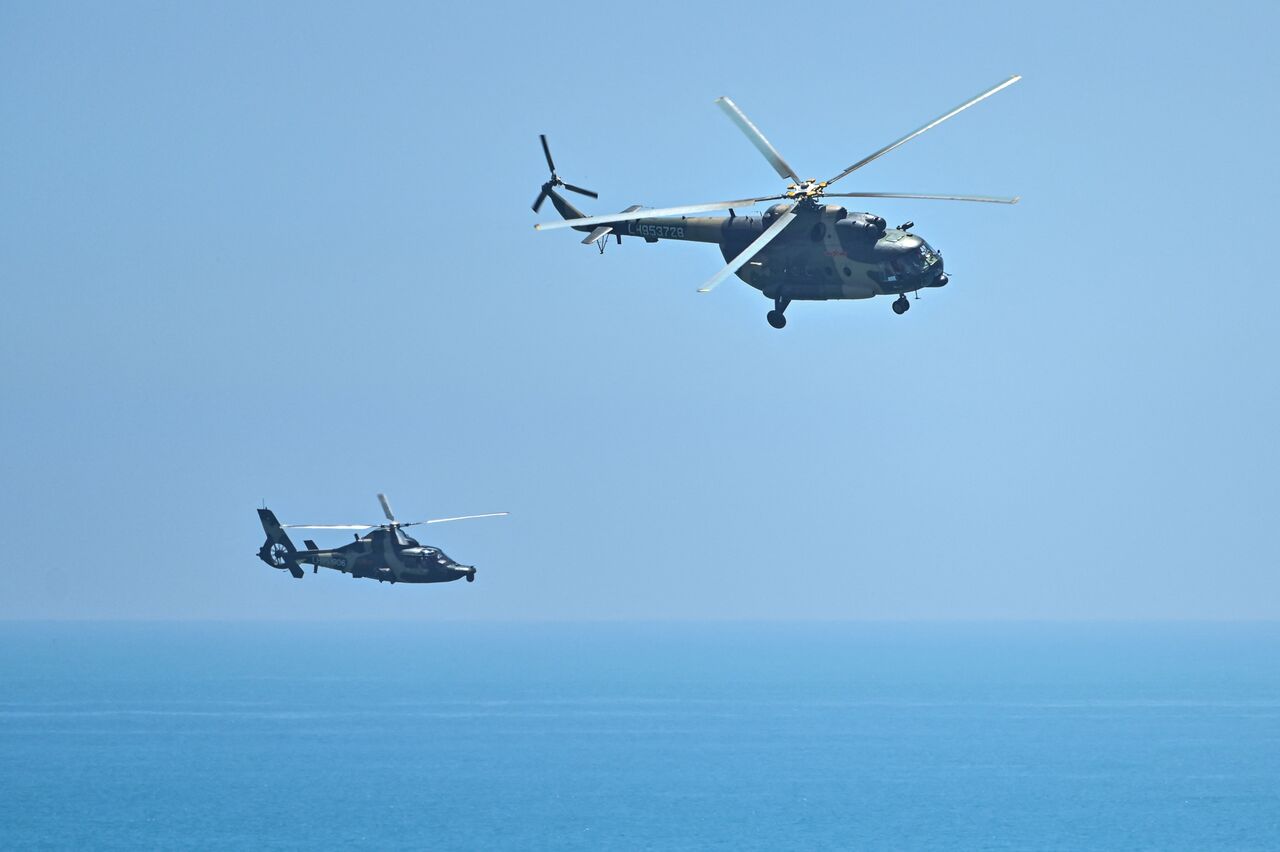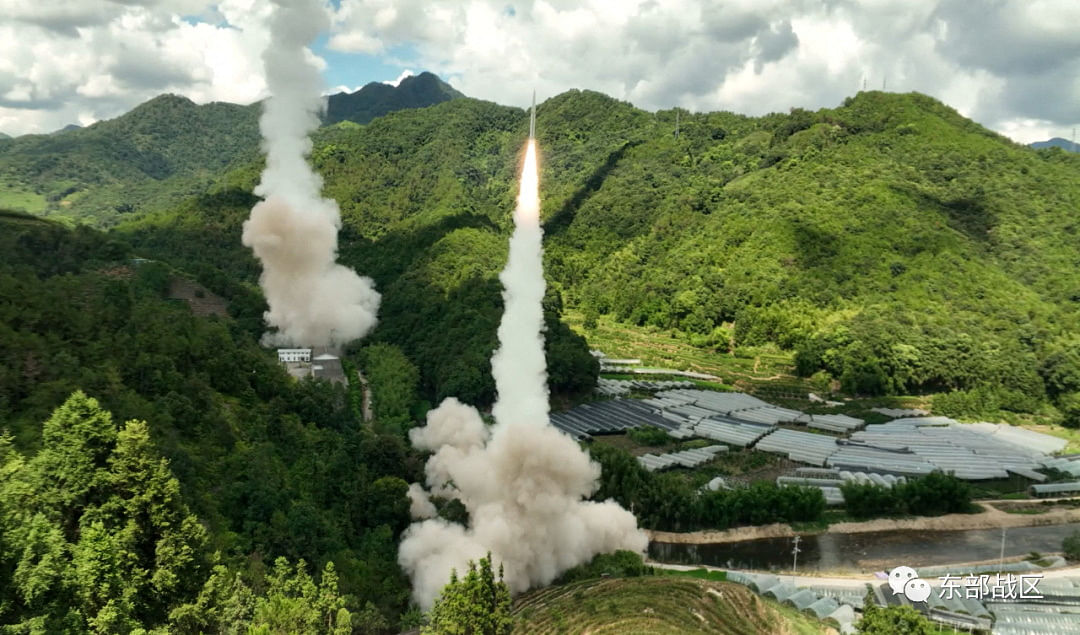China’s military makes dozens of crossings of Taiwan median line
Sign up now: Get insights on Asia's fast-moving developments

Chinese military helicopters fly past Pingtan island, one of mainland China's closest point from Taiwan, on Aug 4, 2022.
PHOTO: AFP
TAIPEI (AFP, REUTERS) – Taiwan’s defence ministry said on Friday (Aug 5) a total of 68 Chinese military aircraft and 13 navy ships were conducting missions in the sensitive Taiwan Strait, and that some of them have “deliberately” crossed an unofficial buffer separating the two sides.
The ministry condemned China in a statement, saying its armed forces have “seriously damaged” the status quo and “harassed” Taiwan’s water and air space.
Earlier, Taiwan’s Defence Ministry said the island’s military has dispatched aircraft and ships and deployed land-based missile systems to monitor the situation there, as China conducts large-scale military drills in zones surrounding Taiwan.
Taipei’s military called Beijing’s latest military drills “highly provocative”.
China pressed ahead on Friday with its largest-ever military exercises encircling Taiwan despite firm statements of condemnation by the United States, Japan and the European Union.
Beijing's decision to fire ballistic missiles and deploy fighter jets around Taiwan saw Washington lambast what it said was a gross overreaction to a visit to the self-ruled, democratic island by US House Speaker Nancy Pelosi.
Mrs Pelosi was the highest-profile US official to go to Taiwan in 25 years and defied stark threats from Beijing, which views the self-ruled island as a breakaway province to be reunited, by force if necessary.
In retaliation, China on Thursday launched a series of military exercises in multiple zones around Taiwan, straddling some of the busiest shipping lanes in the world and at some points coming just 20km from the island's shores.
The drills involved a "conventional missile firepower assault" in waters to the east of Taiwan, the Chinese military said. Beijing has said they will continue until midday on Sunday.
Beijing's state-run Xinhua news agency reported that the Chinese army "flew more than 100 warplanes including fighters and bombers" during the exercises, as well as "over 10 destroyers and frigates".
State broadcaster CCTV reported that Chinese missiles had flown over Taiwan.
Taiwan said the Chinese military fired 11 Dongfeng-class ballistic missiles "in several batches".
Japan said that of the nine missiles it had detected, five landed in its exclusive economic zone (EEZ), with four of them "believed to have flown over Taiwan's main island".
Taiwan has said it would not confirm missile flight paths, however.
"Considering the main goal of CCP's (Chinese Communist Party's) launch of missiles is to intimidate us and in order to protect the military's intelligence, surveillance and reconnaissance capabilities, we will not release information such as its flight," Taiwan's defence ministry said in a statement.
China has defended the drills as just countermeasures in the face of provocations by the US and its allies in Taiwan.
But the drills have triggered outrage in the US and other democracies.
"China has chosen to overreact and use the speaker's visit as a pretext to increase provocative military activity in and around the Taiwan Strait," Mr John Kirby, a White House spokesman, told reporters.
"The temperature's pretty high," but tensions "can come down very easily by just having the Chinese stop these very aggressive military drills", he added.
Japan has lodged a formal diplomatic complaint against Beijing for the drills, over the missiles that landed in its EEZ.
And Prime Minister Fumio Kishida on Friday slammed the drills as a "serious problem that impacts our national security and the safety of our citizens" and called for an "immediate cancellation of the military drills".
China has summoned the Japanese ambassador in Beijing to lodge stern representations over its participation in an “erroneous” Group of Seven (G-7) nations statement on Taiwan, the foreign ministry said on Friday.
Chinese Vice-Foreign Minister Deng Li issued the diplomatic complaint to Japan’s ambassador to China on Thursday, the foreign ministry statement said. Earlier, the ministry said it issued a similar complaint to certain European countries and EU envoys to China over the matter.

But Chinese Foreign Minister Wang Yi said in Phnom Penh, on the sidelines of a regional summit on Thursday, that the "flagrant provocation" by the US had set an "egregious precedent".
He said: "If it's not corrected and countered, will the principle of non-interference in internal affairs still exist? Will the international law still be upheld?"
The manoeuvres are taking place along some of the busiest shipping routes on the planet, used to supply vital semiconductors and electronic equipment produced in East Asian factory hubs to global markets.
Taiwan's Maritime and Port Bureau has issued warnings to ships to avoid the areas being used for the Chinese drills.
The Taiwanese Cabinet has also said the drills would disrupt 18 international routes passing through its flight information region (FIR).
Several international airlines have told AFP they will divert flights from airspace around Taiwan island.
"China's planned live-fire exercises are occurring in an incredibly busy waterway," Mr Nick Marro, the Economist Intelligence Unit's lead analyst for global trade, wrote in a note.
"The shutting down of these transport routes - even temporarily - has consequences not only for Taiwan, but also trade flows tied to Japan and South Korea."
But markets in Taipei appeared to shrug off the tensions, with the Taiwan Taiex Shipping and Transportation Index, which tracks major shipping and airline stocks, up 2.3 per cent early Friday.
And analysts broadly agree that despite all its aggressive posturing, Beijing does not want an active military conflict against the US and its allies over Taiwan - just yet.
"The last thing Xi wants is an accidental war ignited," said Dr Titus Chen, an associate professor of political science at the National Sun Yat-Sen University in Taiwan, referring to Chinese President Xi Jinping.


